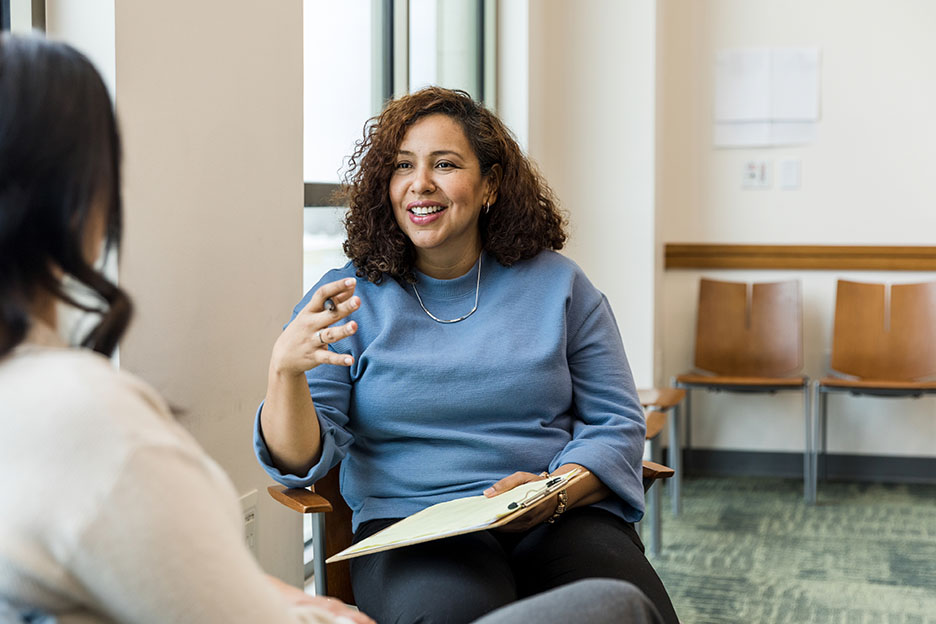Curriculum
The M.Ed. in Mental Health Counseling is designed to provide students with an overarching understanding of the role professional counselors play. Students will also learn the specific skills and interventions needed to work successfully with diverse groups of people in family, employment and community settings.
Degree Requirements Overview
Students must complete 60 credit hours to earn their online M.Ed. in Mental Health Counseling.
- Core courses make up 21 credit hours
- Mental health counseling courses make up 15 credit hours
- Clinical training courses make up 9 credit hours
- The remaining 15 credit hours are fulfilled by specialty elective coursework
Clinical Training
Our coursework prioritizes personalized training that aligns with each student’s professional goals. Students are required to secure practicum and internship placements in their community at an agency of their choice (with approval by the College of Education). Students will collaborate with the clinical coordinator to establish training agreements with their chosen sites.
Professional Counseling Licensure
Our program covers a comprehensive range of professional counseling roles, equipping students with the necessary skills applicable to a wide variety of settings. It also prepares students for LPC licensure in Pennsylvania, although additional requirements such as exams and supervised post-graduation hours must be completed independently.
Course Format
Our Master of Education in Mental Health Counseling is an online synchronous program, giving students the flexibility to earn a degree from home without missing out on the hands-on activities that define a world-class mental health counseling degree. The curriculum has been intentionally structured to balance clinical experience and research training throughout the program.
In our cohort model, students will complete collaborative and individual assignments while also participating in virtual evening lectures. Coursework may include:
- Discussions
- Individual and group projects
- Internships
- Live evening classes
- Role-playing simulations
- Self-reflections
- Written assignments
Course Descriptions
Core Courses (21 credit hours)
This course teaches the principles of psychological measurement (e.g., tests construction, technology, validity, reliability and functional utility). It also covers ethical, legal and cultural issues in the administration and interpretation of psychological tests and includes components of case conceptualization, reporting and presentation.
This course is an examination of the career development process and interventions for children, adolescents and adults with a culture-centered perspective. Students study theorists, vocational assessment processes and occupational and psychological information systems.
In this course, students gain an understanding of theory, research and technique of counseling within a cultural context.
This course is an examination of the influence of culture, gender and disabilities on behavior and attitudes. Students will look into historical and current perspectives on race, culture, gender and minority group issues in education and psychology. This course includes lectures and small group discussions.
Helping Skills is a course designed to provide counselor trainees with didactic and experiential learning opportunities to facilitate and enhance beginning counseling skills. Counselor trainees will begin to develop an understanding of the counselor’s role in assisting or inhibiting client change. This course utilizes such techniques as modeling, role-playing, audiotape feedback, as well as other learning modalities. Particular emphasis is given to theoretical frameworks, cultural competency and self-understanding.
This course is an examination of prevailing theories of human growth and development across the lifespan, and of the interactive effect of various age groups upon one another. There is a particular emphasis on helping relationships.
This course teaches the basic principles of research, techniques of gathering and analyzing data and the design of studies in education. There is an emphasis on critical reviews of research reports representing various methodologies, and a research report is required in the course.
Mental Health Counseling Courses (15 credit hours)
Students learn about the professional, ethical and legal issues surrounding counseling. They also gain knowledge into the management and delivery of counseling services in a culturally diverse society, while also learning about professional development, certification, licensure and role identification for counselors.
This course serves as an introduction to the process of group counseling and therapy. Students get hands-on experience with the selection of group members, group rules, group procedures with children, adolescents and adults and ethical considerations with groups. This is an in-depth study of research on group processes, group therapy and group leadership.
In this course, students participate in researching the current trends in the practice of family counseling and get an overview and analysis of major theoretical approaches of family therapy.
This course introduces students to advanced counseling techniques including risk management and empirically supported treatment (EST) approaches. In addition, students develop knowledge in treatment planning, outcome evaluation and applying EST in a multi-culturally sensitive manner. The course utilizes readings, discussion, video clips and presentations to help therapists-in-training develop the awareness, skills and confidence needed to manage complex therapeutic processes. Emphasis will be placed on students’ professional identity development and the ability to engage in counseling relationships.
Students get an introduction to the organization and description of data. Learn the principles of statistical inference including hypothesis testing, interval estimation and inferential error control in a course with an emphasis on application.
Clinical Training (9 credit hours)
Practicum field experience in professional practice settings with accompanying seminar meetings. Students must meet a minimum of 100 documented hours on site.
Twenty hours of weekly supervised practicum training for advanced graduate students in individual, group and family counseling and therapy.
Twenty hours of weekly supervised professional practice in a school or agency setting as an extension of the Master’s Practicum. On-site supervision, audio and/or video recordings and case presentations are required in this course.
Specialty (15 credit hours)
Students must take at least one advisor-approved 3-credit elective from each of these three areas (9 credit hours):
- Biological and Neuropsychological Bases of Behavior
- Social Justice, Diversity, Trauma and Loss
- Abnormal Behavior and Psychopathology
6 credit hours of advisor-approved electives

